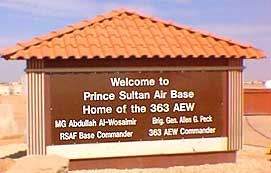Is Withdrawal of US Forces from Saudi Arabia Enough?
 |
The U.S. government should be given credit for doing the right thing--announcing the termination of the large American military presence in Saudi Arabia. But the move is long overdue and was made easier politically by an equally dangerous U.S. invasion and military occupation of Iraq.
The Bush administration is using the cover of its victory in Iraq to belatedly remove a substantial threat to the stability of the Saudi regime and a major lightning rod for anti-American terrorist attacks by fundamentalist Islamic groups. Even Deputy Secretary of Defense Paul Wolfowitz has admitted that the U.S. military presence in the Saudi kingdom was putting Americans in the crosshairs of the terrorists.
That late coming revelation has been obvious to anyone who read the writings of Osama bin Laden since the early 1990's. Bin Laden became enraged at the United States mostly by a U.S. military presence that he believed desecrated the holiest sites of Islam and supported a corrupt Saudi monarchy. (U.S. support for Israel and sanctions against Iraq were only secondary gripes added to gain wider support for his cause in the Arabic and Islamic worlds). In contrast to the allegations of President Bush, the September 11 attacks were not caused by the terrorists' hate of American democracy (nor by hostility toward American culture or prosperity). Yet even with plenty of warning--bin Laden's attacks on two American embassies and Africa and on the U.S.S. Cole--the U.S. government did not eliminate its unneeded military presence from Saudi Arabia.
The ease with which the U.S. military recently demolished the already devastated post-Gulf War I Iraqi military indicates that the threat U.S. forces were defending against in Saudi Arabia was hollow. (Even after Saddam Hussein's invasion of Kuwait in 1990, when the Iraqi military was much stronger, economists from across the political spectrum argued that there was no need to use military force to ensure the continued flow of Persian Gulf oil.) Furthermore, even if weapons of mass destruction are eventually found in Iraq, Saddam Hussein's restraint from using them--despite the most dire threat possible to his regime--indicates that his threat to Saudi Arabia, the Persian Gulf, and the Middle East was overblown by an administration bent on an extended war on terrorism merely "for show."
But, ironically, an invasion and occupation of Iraq in the name of fighting terrorism will probably cause an increase in anti-American terrorist attacks from fundamentalist Islamic sources. The Bush administration has merely replaced a military presence in one nation that is home to Islamic holy places with the armed occupation of another. Iraq also has holy sites and is the cradle and academic and spiritual center of Shiite Islam. The administration should remember that the "infidel" Soviet occupation of the Islamic nation of Afghanistan during the 1980's drew fanatic Islamic fighters from around the world in opposition. During Gulf War II, signs arose that the holy sites in Iraq might spur a similar response there as the U.S. occupation drags on. And after recent U.S. conflicts in Afghanistan and Iraq, the administration also has the problem that the Islamic world perceives the American war on terrorism as a jihad against the faith.
So although a U.S. withdrawal from Saudi Arabia should be commended, trading a military presence in one nation with Islamic holy sites for another is unlikely to insulate the United States from anti-American attacks of terror. Therefore, in the wake of its victory in Iraq, the Bush administration should astutely withdraw U.S. forces from Iraq soon and allow the international community to keep the peace, help reconstruct the Iraqi economy, and smooth the transition to democracy. Only then can anti-American terrorism--the real threat facing the United States today--be reduced.
Ivan Eland is Senior Fellow and Director of the Center on Peace & Liberty at The Independent Institute in Oakland, California, and author of the book, Putting "Defense" Back into U.S. Defense Policy: Rethinking U.S. Security in the Post-Cold War World.
Topics: 9/11, Conflicts And War, George W. Bush, Iraq, Saudi Arabia, Terrorism, War
Views: 4455
Related Suggestions
smokescreen ploy simply to justify the "real"
objective: a "face-saving" excuse to cave in to
the long-standing demand for the US to pull
out of Saudi Arabia. It just seems
inconceivable that the US really thought Iraq
was so much more of a threat than it seems
to have turned out to be. In retrospects it
seems much more likely that Iraq was the
excuse, amplified by fabricated reports that
solidified the appearance of a threat. Perhaps
time will tell (with a little help from the
Freedom of Information Act).
I think that all the milatary and westerners should leave the middle east, so that islam can become more powerful again.
As the westerners bring bad things with them that can influence others, for example Turkey.
They should go back to their own countries and try to bring peace in their own back yards rather trying to bring peace other places.
Regards, Latheef

















